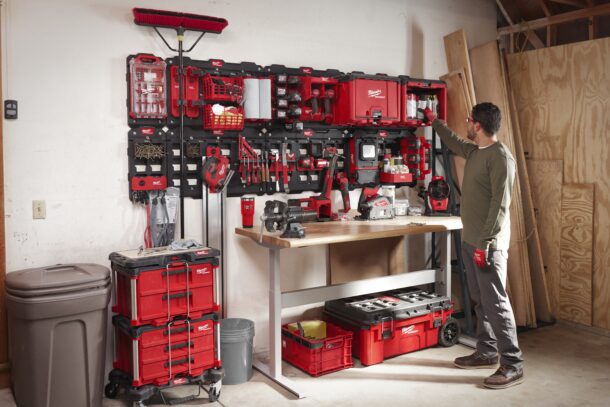It’s easy to assume contractors, tradesmen and craftsmen are continually found on the road, traveling from place to place, rendering their skills wherever there’s work to be found. But the larger jobs, those that require multi-year commitments or specialist equipment are often localized, and for good reason.
Of course, the example of a construction site being based around the area of development is so clear and obvious it requires no further thought, but it’s also important to consider other areas of cultivation you may not have invested in just yet.
For example – is now the time for you to build a helpful commercial workshop? From this space, you could integrate the best of your craft, pick up freelance clients, and invest in equipment that you may not be able to bring with you to alternate job sites.
In this post, we’ll discuss the logistics and planning approach towards cultivating an excellent and reliable workshop, no matter your trade. Over time, this space can become the pride of your professional standing, outside your collection of satisfied and appreciative clients.

Finding Your Ideal Workshop Venue
First, your workshop needs to be situated in a reliable location that can withstand the rigors of your craft. It’s important to consider not only how you’ll use the space, but who will use it, who it will be located near, and what amenities you need to consider.
It’s also important to assess the accessibility and safety of the area (can it take a brand new clear lighting and ventilation system?) and ensure the venue aligns with the workshop’s goals – for example, if you’re using power tools then the last thing you need is local businesses complaining about noise during the day.
Of course, affordability and client-focused considerations are also worth keeping in mind. If you’re a contracting firm operating from a small office with tradies on the road, you may only need an organizational centre. If you’re a tradesman with a specific skill like a luthier, you may need to cultivate a more specific environment.
Collecting & Protecting Your Tools
The tools you use in your workshop are the backbone of all commercial activity you work on, in or out of the workshop. No tools, no revenue or productivity. Because these tools are valuable (as you no doubt realized when buying them), it’s important to establish a systematic approach to collecting and protecting these instruments to ensure smooth operations.
First, create an inventory of tools, categorize them based on functionality, and implement a storage system that facilitates easy access to the right people, and only the right people. You can Invest in durable containers and protective measures to prevent wear and tear on top of that.
Additionally, consider digital tracking where you can, like scanning systems on certain toolboxes if they’re being taken out on a job. This way, you can enhance accountability while also keeping up on repairs and making sure thefts and other difficulties are either prevented, or at the very least much less common.
Outfit Your Space Reliably
One of the most fun and interesting elements of building a workshop is outfitting the space with the functionality you need, especially regarding your chosen craft. Every element contributes to the overall functionality, and define just what you can use the space for.
For example, gantry cranes excel in handling heavy lifting tasks, adding a layer of efficiency to your workspace, especially from the loading bay inward. When outfitting your space, consider the strategic placement and integration of equipment like this and vehicle storage areas, where you’ll take in shipments and deliveries, and the production space you can control the airflow of to ensure greater control going forward.
Then comes the more specialist tools you may have to install, like installed manufacturing equipment, lathes, woodworking tools, buffering wheels and more. It’s also important to make sure this is wired correctly, and that multiple STOP buttons kill power to certain utilities in the interest of safety. You can also use shutters and door hoods to prevent dust and other debris from your workshop from leaking into the wide area.
Fire Safety Is Key
As the owner or operator of any premises, fire safety is your responsibility through and through. Take the time to craft a comprehensive safety plan by investing in quality fire extinguishers strategically placed for accessibility and use. Of course, if you’re using electrical equipment, then foam extinguishers are needed, not water.
You should also clearly mark emergency exits and conduct regular drills for a swift and organized evacuation when they really count. Practice safe storage, segregating flammable materials that may be in your workshop, and make sure you maintain an organized workspace to minimize fire hazards. Trip hazards, debris and dust, all of this can be a threat. Comrepehsnvie inspections to see these in advance is key, and so make sure you hold them regularly too.
Of course, fire alarms and other detection systems, as well as conducting regular training sessions to educate your employees is key. It’s also good to keep a constant headcount or better yet, a sign-in, sign-out system so you can more easily know when everyone is evacuated will be so much better, and may even save the life of a fire crew member. That’s how important fire safety is, especially in an environment where heavy tools are used continually.
Bonus: Make Your Presence Known!
It’s important to note that if you’re a public-facing brand, or you simply want to network with your local scene, it’s good to proudly showcase that you’re located here. Ensure you have some signage fashioned with your name and contact information, and curate a small waiting space for clients, partners, and even job candidates. It will help improve the professionalism of your workshop and allow it to become the main asset and ambassador of your brand.
With this advice, you’re certain to implement the smart logistics and cultivation of a reliable workshop. Over time, this could provide a fantastic new milestone and chapter in the life of your trade firm, no matter what discipline you’re part of.




Join the conversation: